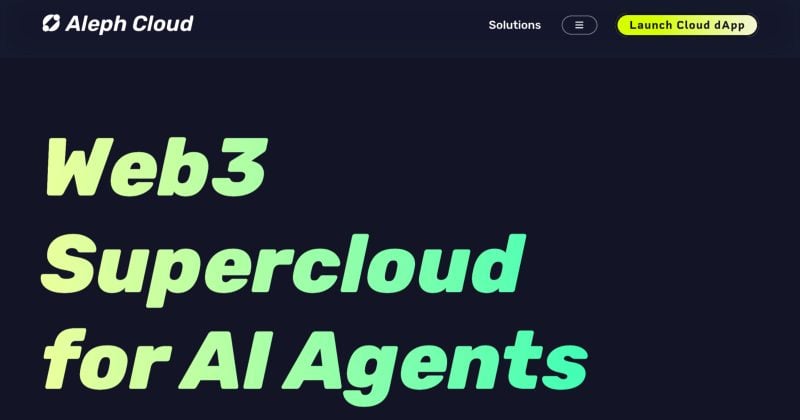Please share this article
As AI systems become more common, there is a growing need for fast, secure, flexible infrastructures that are not tied to central providers.
What is Aleph Cloud?
Aleph Cloud is a chain-independent GDPR-compliant SuperCloud that provides scalable storage, computing and database services over a network of distributed nodes.

The platform combines dynamic IPFS-based storage with variable databases and secure computing resources to support applications ranging from real-time data processing in games to large-scale AI model deployments.
The wider Aleph ecosystem is also working Twentysix CloudA set of services that simplify the deployment and management of applications in this distributed infrastructure.
Benefits of AI Agents
AI agents need constant access to reliable, calculated power and secure up-to-date data. Offered by Aleph Cloud:
Scalable calculation options:
- On-Demand and Persistent VMs: Aleph Cloud offers a variety of VM options that are in demand and sustainable for different workloads. For high computing tasks, confidential VMs provide an isolated, secure environment.
- Serverless Functions: Similar to AWS Lambdas, but these features built on distributed networks allow efficient event-driven computing without long-term resource commitments.
Safe handling:
- Confidential VMS: Uses hardware-based encryption (AMD SEV) and end-to-end encryption for data transfer to keep sensitive calculations private.
Flexible multi-chain integration:
- Multi-chain support: Enables AI agents to interact seamlessly with different chains, making it easy to build and deploy applications across multiple ecosystems.
Upcoming GPU Marketplaces:
- This feature, which is scheduled to launch in Q1, supports high-performance tasks such as AI training and rendering, further enhancing the platform capabilities of your AI workloads.


Key technical features
Computing Solutions
Aleph Cloud offers both on-demand and always on VMs and serverless features.
Confidential VMs are configured with AMD SEV encryption and provide an isolated environment for sensitive AI calculations.
Storage and Data Management
Dynamic IPFS-based storage combined with Mutable databases and encrypted volumes.
This approach supports real-time updates and data management. This is essential for AI agents that need access to evolving datasets.
AI and GPU support
Future features are Public GPU Marketplace (estimated for the first quarter of 2025). This enables efficient AI training, image and video rendering, and high-performance computing tasks.
Built using Libertai, a distributed AI platform that securely hosts, trains and executes open source AI models along with Libertai.io, AI agents directly benefit from GPU integration in Aleph Cloud. You'll get it.
Real-time monitoring
Tools for real-time resource monitoring allow users to track performance metrics and scale resources dynamically.
Use Cases
game
Collaboration with ubisoft allows for dynamic NFT metadata use in chains. Champion's Tactics and Captain Laser Hawk.
Since 2021, Ubisoft has run its own core channel node Ubistratlab with Aleph Cloud, which validates the network and provides critical storage resources. This infrastructure allows Ubisoft to securely manage dynamic NFT metadata, allowing gamers to create, transfer, buy or sell in-game assets with unique and personalized characteristics.
These applications manage in-game assets and fair property distributions via verifiable random functions (VRFs) to ensure transparent and fair gameplay.
Distributed Identity
Our partnership with Synaps and Anima leverages Aleph Cloud to provide secure, self-successful identity management, allowing users to securely control and share personal data.
Data indexing
For applications built on high-throughput chains, such as Solana, distributed indexes provide an efficient way to query on-chain data.
This is particularly beneficial for distributed finance and applications in other areas where real-time data processing is important.
AI-driven applications
Aleph Cloud supports AI agents and large-scale AI models development. By providing scalable computing resources, robust storage, and a secure environment for AI inference, the platform allows both startups and businesses to deploy innovative autonomous systems without relying on centralized infrastructure .
Token Utility and Economic Models
Aleph Cloud utilized native aleph tokens within a defined supply of 500m tokens. 247m is currently betting in circulation, with 93m currently betting.
To participate in the network, the node operator must bet 10k tokens, and anyone running a Core Channel Node (CCNS) must bet 200k tokens without lockup or vesting requirements. This staking acts as collateral to ensure reliable service, and operators are rewarded with an aleph token for their contributions.
Core Channel Nodes form the backbone of the ALEPH network by enabling security, transaction processing, data storage, and cross-chain communication for distributed applications.


Tokens are used for efficient microtransactions to pay for services such as storage, computing, and data synchronization.
Note that Aleph Cloud does not have a token holder governance mechanism.
Comparative view
Compared to other solutions such as Arweave, FileCoin, Render, Akash, AWS, and Google Cloud, Aleph Cloud distinguishes itself by combining dynamic storage and distributed computing resources with a privacy-first chain magnification framework. for example:
- For storage specialists (Arweave/Filecoin):
Aleph Cloud offers flexible storage with dynamic data management and integrated calculations rather than static persistent storage. - For GPU-centric solutions (rendering):
Future GPU marketplaces and versatile computing solutions will support AI workloads more widely. - For Compute MarketPlaces (Akash):
Using confidential VMs and robust node structures provides greater security compared to container-based deployments. - For Intensive Giants (AWS/Google Cloud):
Aleph Cloud offers cost-effectiveness and censorship resistance through distributed architectures without compromising performance or security.


Conclusion
Aleph Cloud offers a secure, scalable and flexible SuperCloud solution that is perfect for AI agents and dynamic applications. The combination of dynamic storage, robust calculations, and multi-chain support meets the latest requirements for AI-powered systems while maintaining privacy and cost-effectiveness.
To support developers and builders, Aleph is $1 million in cloud credits This allows teams to experiment, build and scale projects.
For anyone interested in further investigation into these features, we highly recommend connecting with the Aleph team at Eth Denver.
For more information, please see Alef Cloud Website Or, please check document.
Stay up to date via Twitter and telegram.
Please share this article

